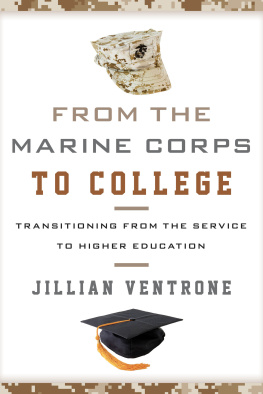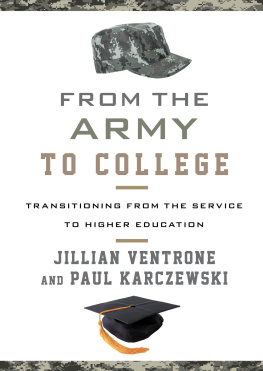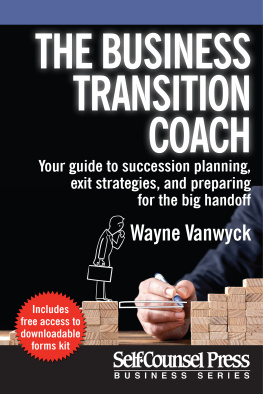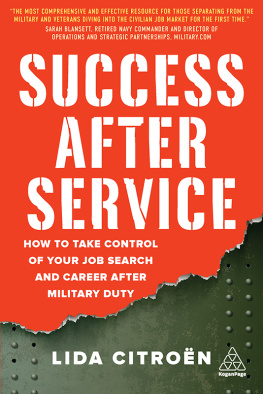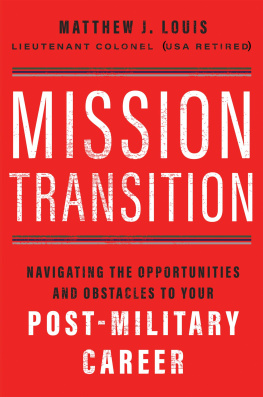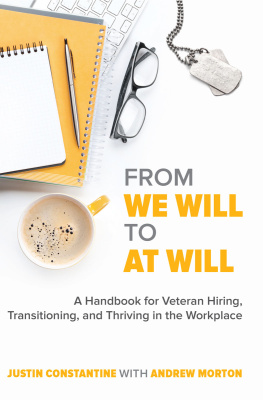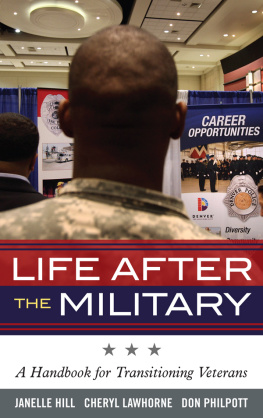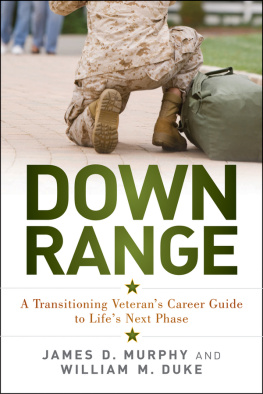Robert W. Blue has been a civilian education and career counselor for the military since 2001, working in the San Diego area on Navy and Marine Corps bases providing higher education services to Marines and sailors of all ranks, from junior enlisted to admiral. He has been responsible for setting up college programs, including classroom instruction, on dozens of U.S. Navy ships.
Julie LaCroix has been a career counselor in private practice for over a decade, based in Southern California and serving adults of all ages.
Roxanne Rapske is a franchise consultant, specializing in using the companys proven franchise matching system and her own unique experience in the business world to consult with clients and to match them to a franchise that offers the best personal and professional fit for their needs. She teaches for a transition seminar for service members held aboard the Camp Pendleton Marine Corps Base in California.
Jillian Ventrone is an adjunct veterans counselor at MiraCosta College, which is part of the California State Community College System. She counsels military and military-affiliated students regarding their higher education and career goals. She has written five other books, also published by Rowman and Littlefield, that were designed to assist service members in the Marine Corps, Navy, Air Force, and Army, as well as dependent family members.
Since this book focuses on the field of business, it is important to determine if this type of work is a good fit for you. This chapter is designed to help you go on a fact-finding mission about yourself: to learn if your personality and interests align with others in the field and to determine if business will be a long-term and comfortable fit for a career. Now, even if you have already made this decision, its still important to read this chapter as business is a broad field, and many different types of positions exist. Follow along with the detailed assessments and learn about your interests and goals. Take a detailed look into your military experience to see if any parallels exist, then integrate them into your new career. The following topics will be addressed in this chapter:
- Assessments
- Occupational Data
- Military Skills Translated for the Job Market
INTRODUCTION
Are you a self-motivated, driven, organized person who is in tune with his or her strengths and weaknesses? Do you know how these traits will help you in the business world? How about the traits you have that may demonstrate an aptitude for entrepreneurship? Most of you probably are not sure of the answers to these questions, and most likely this is because you need more information about yourself, including your work interests, abilities, skills confidence, work values, and income and lifestyle goals, in order to answer them. This is the time when career assessments can be a beneficial tool in your civilian career planning.
Once you are done taking the assessments and learning a bit more about yourself, you need to consider factors specific to jobs in the world of business and entrepreneurship. Some of these positions will require long hours including weekends, frequent travel, high demands and fast deadlines, and public speaking coupled with the ability to communicate often and confidently. You need to consider the job demands as well as your aptitude and interest in taking on these demands. Much of this information will be covered throughout the book, but keep it in mind while following along with the assessments and tools listed in this chapter.
All the factors listed in the previous paragraph can also be an attribute of business ownership. Even those of you who are multitalented will still need to fill in the areas in which you find gaps. Taking the assessments will help you uncover these gaps; then you can strategize about fixing them or finding people or strategies to support you. This way, you can make better and more informed decisions. Ignoring the information you gather wont make it go away, it will just make you ill prepared.
ASSESSMENTS
You have decided that you are separating/retiring from the service and are ready to pursue a future civilian career. You are interested in the field of business, but you dont know where to start or whether its a good fit. Some of you may have recently separated from the service and participated in the weeklong Transition Readiness Seminar (TRS); others may have separated before TRS was developed. Those of you who completed TRS may be familiar with one of the assessments we are going to go through in this chapter. Now, for many years, two of the authors of this book taught the two-day higher education track that is a follow-on course to the week-long TRS program. They spent quite a bit of time reviewing the assessments that students were supposed to have completed during the weeklong program; however, many did not take them as required and, in most cases, they were not reviewed in the one-week, mandatory TRS class, anyway. The two authors who facilitated the groups made sure to give students time during class to complete the assessments as they are integral to students learning more about their personality traits, career interests, skills confidence, and work values. Basically, this will tell you what you enjoy, where your confidence is, and what values and skills you hold for the workplace environment. While the assessments wont tell you which career track you should ultimately take, understanding these traits will give you a springboard from which you can launch your career planning.
Now, whether you realize it or not, you have all taken a vocational assessment before. The Armed Services Vocational Aptitude Battery (ASVAB)! Little did you know at the time, but that test was going to follow you around for the rest of your military career, for some more than others. As to those of you who stayed in the military for more than one enlistment, many attended specialty schools, submitted officer packages, or wanted to change Military Occupational Specialties (MOS) or ratings. Most of these options required minimum scores on the ASVAB, and often in specific areas. The test is different from other vocational assessments in that it also measures aptitude, that is, how well you have developed your skills and their potential for further training.
The ASVAB incorporates theories from John Holland, who served in the Army during World War II. After separating from the service, he went on to get a masters degree and a PhD and to develop a career theory that is prevalent in the world of career counseling. When the old transition program was initially redesigned about a decade ago, the Holland Self-Directed Search (SDS) paper-based assessment was used by those who taught the education portion of TRS. This was during the time that everyone attended the education or vocational portion, as it was built into the week that was mandatory for every service member to attend. One of the authors of this book knows this as she was a part of the process of developing the materials and launching the new course aboard a base in Southern California. As TRS evolved, the SDS was replaced by a digital version, Defense Activity for Non-Traditional Education Support (DANTES) Kuder Journeys assessments (https://dantes.kuder.com), which is also based on Hollands theory.
Hollands theory is based on the idea that peoples career choices are an extension of their personalities, and that people express themselves, and their interests and values, through their work choices. His theory assigns both people and work environments to specific types or themes. He believed that in our culture, people are strongest in one personality type, that all professions might require people who fit all personality types to a degree, and that people who work in a profession and environment that are a fit for their type of personality tend to be more successful and to find more satisfaction in their work. Think back to your ASVAB test results: this may also prove true for those who enter the military. However, I should state that this is true for those who entered the military and were assigned positions based on their assessment results, as many are assigned simply based on the needs of the particular service branch they entered.


